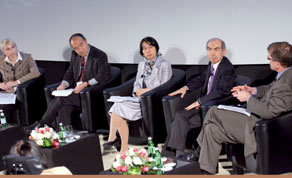 |
| The experts are seen during the discussion |
Panellists at the Shafallah International Forum have addressed the issues of caring for people with disabilities during and after natural disasters, as well as policies regarding refugees with disabilities.
Badaoui Rouhban, director of Unesco Section for Disaster Reduction, said that if countries and NGOs don’t invest in disaster preparedness, they ultimately end up paying more in disaster response, usually with the poor bearing the burden as they are less prepared and more vulnerable. He said disaster preparedness need not be expensive, but a culture of safety needs to be developed in places like Haiti where earthquakes can occur but buildings are not built to a safe standard.
He warned that we are heading towards more natural disasters in the future due to climate change, urbanisation, demographic changes and greater interconnectedness, but greater scientific and technological know-how can help make societies better prepared to take care of people with disabilities during the response.
Panellists agreed that it is also crucial that relief workers and first responders are properly trained to care for people with disabilities, as their conditions are often misunderstood and can lead to conflicts. Osamu Nagase, Associate Professor for Disabilities Studies at the University of Tokyo, gave the example of a young autistic boy who was reprimanded by a relief worker for trying to take a piece of bread when he could not in fact eat what he was given after last year’s disaster in Japan.
Ronald McCallum, chairman of the UN Committee on the Rights of Persons with Disabilities said that there are too few countries willing to take in refugees and asylum seekers with disabilities due to fears of excessive costs. He advocated bringing people with disabilities into the decision making process, both in terms of policy making and practical implementation of those policies on the ground. He said that this would not only make governments and NGOs more responsive to the needs of disabled people, but would also improve their integration into society through education and employment.
Mary Crock, Professor at University of Sydney, said that a review is needed for policies covering disabled refugees, including a review of definitions of persecution and the determining factors for returning them to their place of origin.
In many cases, refugees may have a particular condition where they need specialised care or treatment, such as dialysis, which may not be available at home. Sending them back home would effectively kill them, and so returning them home cannot be the standard policy.
The definition of persecution must also be assessed, as people with disabilities may be in a more fragile condition than a regularly healthy person, and so the threshold for suffering is lower. All of the panellists addressing these issues see the Convention on the Rights of Persons with Disabilities as a step in the right direction, and are awaiting the implementation of the convention by countries that have ratified it.
However, McCallum lamented that ratification and implementation was slow, and not without great difficulty. He encouraged NGOs to file their own “shadow reports” in order to keep international agencies aware of individual countries’ human rights situations. Cherie Blair, who moderated the panel discussion on refugees with disabilities, told the Gulf Times that discussion of these topics was relatively new. “I don’t think people have really spoken about it much before. It’s an issue that’s both timely and fairly new, and sparking that interest will be a start for both study and detailed policies elsewhere,” said Blair.
She explained that “this seemed to be an area where Qatar could give leadership and really make a difference because it was very underdeveloped. And the fact that since it started, there are more and more examples of where it’s needed, is not simply a coincidence but an inevitability.”

